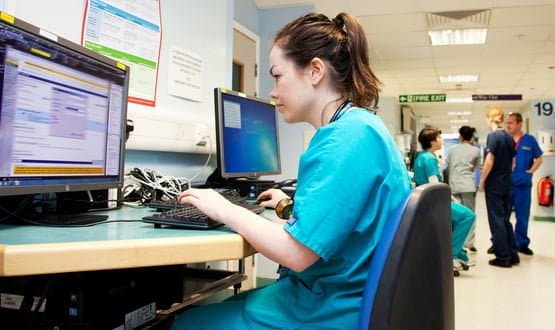Two GDE trusts go live with link-up of electronic patient records
- 23 April 2018

A CCIO has said he is helping to “break down the barriers between data” as two trusts go live with a link up of their electronic patient records (EPRs).
Both Dermot O’Riordan, CCIO at West Suffolk Hospital NHS Foundation Trust and Afzal Chaudhry, CCIO at Cambridge University Hospitals NHS Foundation Trust (CUH) spoke to Digital Health News about the link-up, which allows clinicians to access patient data that is held within the other trust’s EPR system: Epic at CUH (Addenbrooke’s and The Rosie hospitals) and Cerner Millennium at West Suffolk Hospital.
From within each hospitals’ EPR systems clinicians can see a patient’s past and present clinical information; from conditions and treatments to latest test results held at the opposite hospital.
The aim is to save time and reduce delays to care and duplication.
O’Riordan said the feature was about himself and Chaudhry “breaking down the barriers between data”.
“It was very much a clinical-led initiative, myself and Afzal both could see the benefits,” he added.
“We both had the clinical vision that this was where we wanted to do and drove it.
“It is a tribute to everybody, from the clinicians to the vendors who did not get in the way.
“What is so great about it is that clinicians are using their own everyday system, [so] there isn’t another password they have to remember.”
The new feature, believed to be the first of its kind in the UK, went live just after Easter after a testing period and around a year of planning.
“We did have some issues but that is why we had the testing period,” O’Riordan said.
“But I have had texts and emails from clinicians saying ‘this is fantastic, thank you for doing it’, which is not something you hear every day in healthcare IT.
“It is really nice to get that kind of recognition for the team’s hard work.”
Looking towards the future, O’Riordan said he is now hoping to try to expand the linking up feature to other trusts, GP surgeries and local ambulance services.
Both trusts are global digital exemplars (GDE), NHS England’s flagship digital programme, which prioritises already advanced digital trusts to act as exemplars for those less digitally mature.
Chaudhry told Digital Health News that he hoped the feature would be his trust’s “blueprint” which GDEs are expected to create for other hospitals.
“This feature is universally positive,” he added.
“It is about providing more timely and higher quality care by providing clinicians with a complete and more informed picture of their patient.”




